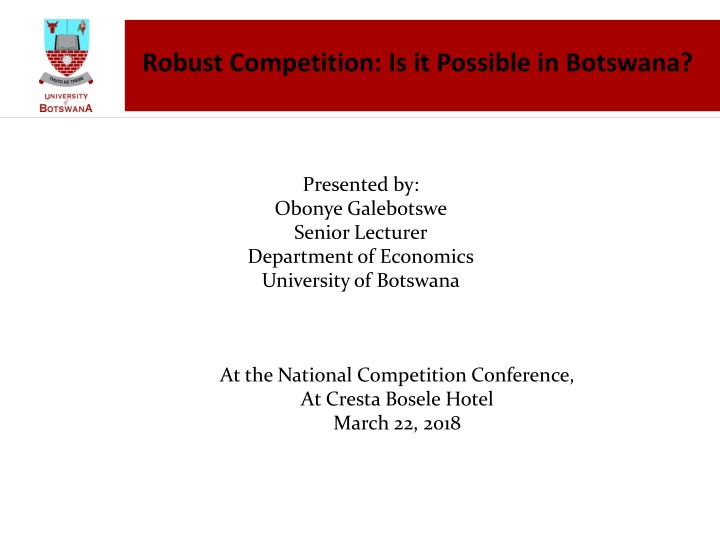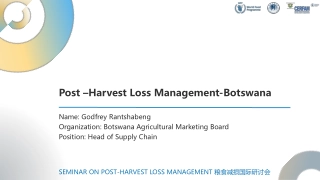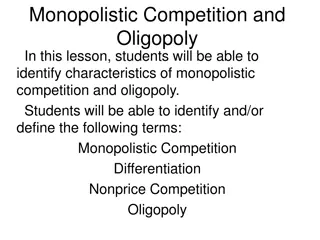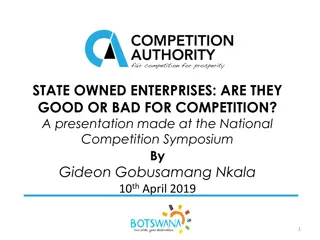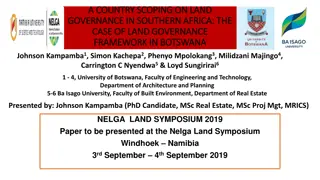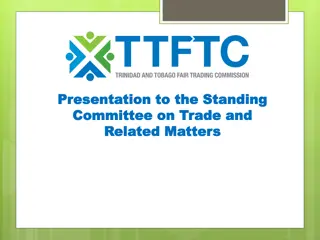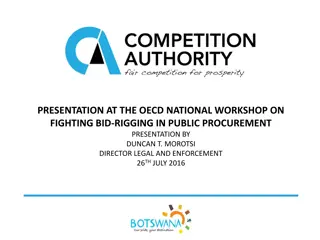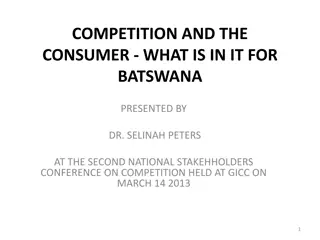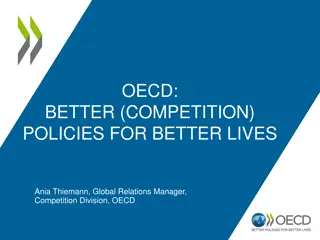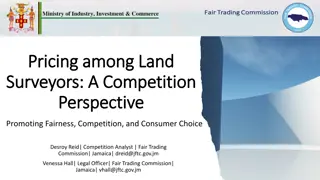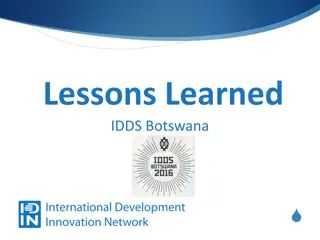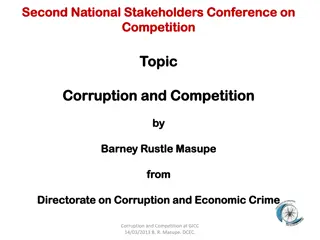Benefits of Robust Competition in Botswana: Insights and Recommendations
Explore the advantages of competition in Botswana as discussed at the National Competition Conference. Learn about the impact on prices, quality, choice, efficiency, innovation, economic growth, and more. Discover how fostering competition can benefit consumers, businesses, and the economy on a global scale. Recommendations for promoting competition are also provided by Obonye Galebotswe, a Senior Lecturer at the University of Botswana.
Download Presentation

Please find below an Image/Link to download the presentation.
The content on the website is provided AS IS for your information and personal use only. It may not be sold, licensed, or shared on other websites without obtaining consent from the author.If you encounter any issues during the download, it is possible that the publisher has removed the file from their server.
You are allowed to download the files provided on this website for personal or commercial use, subject to the condition that they are used lawfully. All files are the property of their respective owners.
The content on the website is provided AS IS for your information and personal use only. It may not be sold, licensed, or shared on other websites without obtaining consent from the author.
E N D
Presentation Transcript
Robust Competition: Is it Possible in Botswana? Presented by: Obonye Galebotswe Senior Lecturer Department of Economics University of Botswana At the National Competition Conference, At Cresta Bosele Hotel March 22, 2018
Outline Benefits of competition What is competition? Indicators of competition in Botswana Factors affecting competition in Botswana suggestions for promoting competition 2
Benefits of Competition & harm of market power Low prices for all: Most obvious benefit of competition is that it results in goods & services being provided to consumers at competitive prices Better quality: to attract more customers & expand market share - improve quality: durable products, work better, better-after-sales, technical support, friendlier service Wider choice: to improve sales they try to make their products different from others leading to more product variety & price ranges for consumers Efficiency & productivity: companies continually pressed to be more efficient and more productive (constant pressure to reduce costs & improve quality of products) otherwise lose market position 3
Benefits of Competition Innovation: In order to deliver choice & better products, businesses constantly pressured to be innovative product concepts, design, production techniques, work organization & services. In today s technology-driven world, innovation allows new firms to enter into markets dominated by incumbents Help workers: Firms competing to hire from specialized labour market may raise wages to attract & retain workers Small businesses & entrepreneurs: Lower input costs when upstream firms compete for opportunity to supply a product to a small downstream or entrepreneur; or a small business/entrepreneur benefits from selling to a greater number of downstream firms negotiate a good price for its products 4
Benefits of Competition Restructuring of sectors: competitive process forces decisions based on market factors like demand-supply, product uses, costs, technologies so uncompetitive sectors or firms wont have finance to continue production International competitiveness: Vigorous domestic competition makes businesses stronger in the global markets too (Michael Porter, 1990) Economic growth: lower prices increase purchasing power of consumers incomes enabling them to buy more goods & services; lowers input costs for other businesses enabling them to expand production; international competiveness leads to market expansion and hence economic growth 5
Competition Defined Domestic competition promotes dynamic economy and inclusive economic growth But how best do we promote and maintain competition? Government intervention or no intervention? Middle ground: intervene to ensure that the competitive process is not distorted Believe: In a free market economy, pursuit of profit is the engine of economic development, but such pursuit of profit might not be compatible with the advancement of economic development How is competition defined? Some view competition in terms of structural characteristics such as a large number of relatively small firms, absence of substantial economics of scale & unimpeded entry into industry Others argue that industry should be judged in terms of performance rather than structure number & size distribution of firms in an industry is irrelevant to the degree of competition. 6
Indicators of competition in Botswana Different definitions lead to different interpretations of market conditions Limited studies on the extent of competition in Botswana BIDPA (2002) Economic mapping study (cited in Monnane Monnane) used market concentration as a measure of the degree of competition in the industry (CR3 with turnover as the measure of economic activity) and ranked industries as follows: 1. Long distance transport 65.7%; 2. Hotel & Restaurants 64.8 % 3. Finance 55% 4. Manufacturing - 54% . Construction 40% Wholesale & Retail 26.8% This study is old: not a true reflection of the market structures today. 7
Indicators of competition in Botswana High concentration levels do not necessarily reflect low competition. Different policy prescriptions regarding the role of competition policy & vigor of enforcement of Competition Law Concentration measures are still useful indicators that guide competition agencies on which industries to worry about for potential abuses of market power. Grynberg and Motswapong (2011) Competition and Trade policy: the case of Botswana poultry industry African Competition Forum study (2016) edited by Simon Roberts Cement & Poultry Other studies can be done to check evidence of: Increasing rents/profits accruing to a few firms Lower levels of firm entry (firm dynamism) Lower levels of labour market mobility Global competitiveness indicators 8
Indicators of competition in Botswana Goods market efficiency ranking (Global Competitiveness Index) Intensity of Competition Extent of market dominance Effectiveness of anti- monopoly policy 2012/13 (rank/144) 74 70 72 2013/14 ( /148) 93 97 79 2014/15 ( /144) 95 121 75 2015/16 ( /140) 72 111 71 2016/17 ( /138) 50 109 63 2017/18 ( /137) 76 110 65 9
Indicators of competition in Botswana Goods market efficiency score (1 -7)- Global Competitiveness Index 6 5 4 3 2 1 0 Intensity of competition Extent of market domonance Effectiveness of anti-monopoly policy 2012/13 2013/14 2014/15 2015/16 2016/17 2017/18 10
Factors affecting competition Input costs power, water, communications, etc affect firm dynamism Government s regulatory environment affects business dynamism (Botswana ranked 111 -2017/18) Government incentive schemes EDD, CEDA, business reservation policy, other IDP measures Trade policy non-tariff barriers (import permits, seasonal trade bans) protect incumbent firms Strategic (anti-competitive) behavior by incumbent firms 11
Factors affecting competition Emerging ownership structures including institutional ownerships mutual forbearance, facilitation of cartels Implementation of competition law uptick of merger & acquisition activity (also a global wave) Detection of collusion Weak penalties for collusive behaviour/monitoring Occupational/professional licensing & price regulations E.g., Botswana Architectural Associations, Constraints to SMME development affects market dynamism 12
Robust competitions: Is it possible in Botswana? Yes, it is possible, but will take time Building a competitive culture takes time & requires resources & uptake of different stakeholders CA should continue to provide leadership Government need to provide more support to the CA CA should be adequately resourced to effectively enforce the law No political or bureaucratic interference 13
What needs to be done? CA Adoption of law is important, but implementation of the law is even more important Advocacy Awareness of the measures of the Competition Act can affect behavior of firms, especially if they believe that there is a credible threat of detection & remedy for actions that breach the provisions of the Act Make anti-cartel enforcement #1 priority Allocate resources to detection & prosecution of hard-core cartels (price-fixing, big-rigging, market division, etc) Impose tough measures on hard-core cartels can act as deterrent given the difficulty of detection Currently financial penalty requires that the Commission satisfy itself that the breach was committed intentionally or negligently? Base decisions on sound economics (theory and empirical evidence) this eliminates or minimizes political rent-seeking No room for political economy considerations in the implementation of Competition Law 14
What needs to be done? Since Competition Law is economics-based, strengthen economic analysis in anti- competitive conduct analysis (otherwise weak enforcement & regulatory capture by some well-resourced businesses) - CA need to be ahead of the increasing sophistication of firms engaging in anti-competitive practices Sharpen market analysis tools to detect anti-competitive conduct- incorporate best economic learning into decision making While tempering the core of efficiency with other developmental goals, ensure enforcement is based on sound economic analysis & lean more towards efficiency considerations Protect competition, not competitors don t pick winners or protect losers Flexibility and forward looking industries are dynamic and so should be the competition authority, lest it becomes an impediment to innovation & competition 15
Context The time to repair a roof is when the sun is shining John F. Kennedy (State of the Union Address, 1962) 16
Thank you 17
